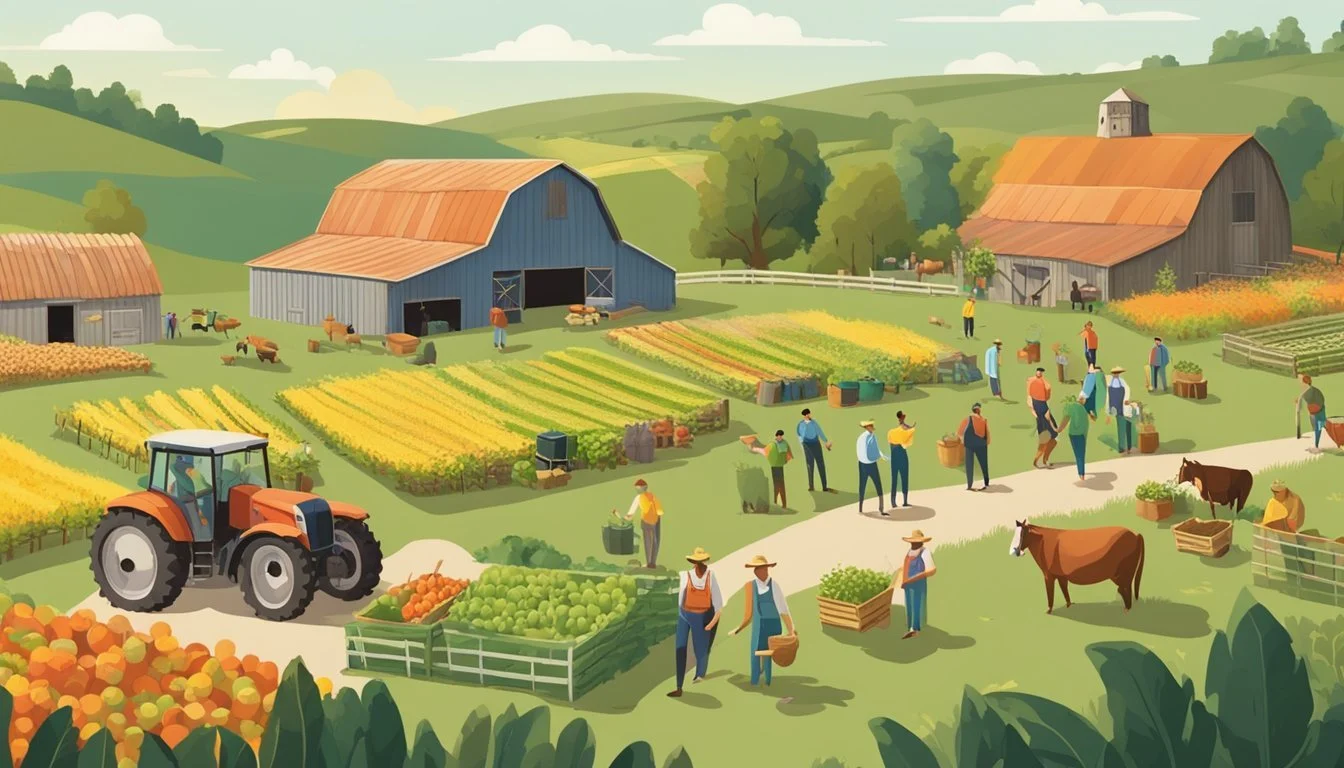Agritourism in Arkansas
Exploring the Natural State's Farmstead Adventures
Agritourism in Arkansas represents a growing trend that capitalizes on the state's rich agricultural heritage and diverse rural landscapes. This industry, which merges agriculture and tourism, allows visitors to experience farm life, from picking fresh produce to navigating corn mazes. Visitors have the opportunity to connect with the land and local farmers, gaining a deeper appreciation for the food on their tables. Arkansas, with its scenic beauty and farm-friendly climate, provides an ideal environment for agritourism to flourish.
Arkansas's agritourism ventures range from orchard visits and wine tastings to hands-on activities like harvesting. These experiences not only serve as recreational outings but also educate the public on farming practices and the importance of supporting local food systems. As travelers seek more authentic and educational vacations, agritourism serves as a way to build a bridge between rural and urban communities, offering a window into the state’s agricultural operations and rural way of life.
The industry has become a significant contributor to the state's economy and a boon for rural areas, offering new income streams for farmers and creating jobs. By embracing agritourism, Arkansas leverages its natural resources and agricultural heritage to promote sustainable tourism, enriching both visitors' experiences and the livelihoods of local residents. These activities underscore the state's commitment to preserving its rural roots while showcasing the diverse agricultural offerings found within its borders.
Overview of Agritourism in Arkansas
Agritourism in Arkansas merges the state's rich agricultural heritage with the growing interest in tourism experiences, bolstering the local economy and educating visitors on farming life.
Definition and Importance of Agritourism
Agritourism refers to the intersection where agriculture meets tourism. It is an innovative industry that allows visitors to experience and participate in agricultural activities firsthand. This form of tourism is crucial as it provides educational opportunities about farming practices and cultivates appreciation for the agriculture industry. Additionally, it opens doors for producers to diversify their income sources and promotes the preservation of agricultural traditions.
The Role of Agritourism in Arkansas' Economy
The influence of agritourism on Arkansas' economy is significant. The integration of agritourism within the state has led to higher local incomes and job creation, particularly in rural communities. As an emerging sector within Arkansas' tourism industry, agritourism capitalizes on agricultural strengths, offering producers alternative revenue streams and increasing the state’s appeal as a destination for unique and educational experiences. This symbiotic relationship strengthens the state's economic framework and supports the agriculture and tourism sectors.
Types of Agritourism Attractions
Arkansas's varied landscape and rich agricultural heritage offer a diverse array of agritourism attractions. These attractions provide visitors an intimate glimpse into the agricultural process, opportunities for hands-on experiences, and enjoyable outdoor activities for all ages.
Farm Tours and Educational Activities
Farm tours present an opportunity for visitors to explore the inner workings of Arkansas's farming industry. Educational activities often accompany these tours, allowing individuals and groups to learn about crop production, animal husbandry, and sustainable farming practices. Families enjoy tours as they offer insights into a farmer's daily life and the chance to interact with farm animals.
U-Pick Farms and Produce
U-Pick farms are a popular choice for those eager to handpick their own fresh fruits and vegetables. These farms often grow strawberries, blueberries, and peaches, among other produce, depending on the season. Visitors appreciate pulling ripe produce straight from the vine, providing an unmatched field-to-table experience.
Farmers Markets and Pumpkin Patches
Farmers markets serve as bustling hubs where local farmers sell fresh produce, handmade goods, and sometimes offer entertainment. Pumpkin patches are particularly festive in the fall, offering pumpkins of all sizes and shapes, corn mazes, and hayrides, turning the task of selecting the perfect pumpkin into a family adventure.
Wineries and Vineyard Tours
The wineries of Arkansas offer tours of their vineyards, giving connoisseurs and casual sippers alike a taste of the local viticulture. Tasting rooms showcase regional wines, and staff often enlighten guests on the nuances of winemaking and grape cultivation in Arkansas's unique climate.
Outdoors and Adventure Activities
Agritourism integrates seamlessly with outdoor adventure, from horseback riding through pastoral settings to eco-tourism ventures that highlight Arkansas's natural beauty. Adventure seekers can often find parklands on farm properties where they can engage with the environment in a more hands-on manner.
Festivals and Seasonal Events
Throughout the year, Arkansas's farms host festivals and seasonal events that celebrate the state's agricultural bounty. These events may include harvest festivals, music performances, craft shows, and more. They serve as a testament to the state’s strong community spirit and its reverence for the cycles of nature.
Regional Highlights of Agritourism
Arkansas offers a rich tapestry of agritourism experiences, from bustling markets to tranquil farm stays. In exploring regional highlights, one discovers a variety of farms, seasonal events, and dedicated associations shaping this vibrant sector.
Notable Agritourism Farms in Arkansas
Bobrook Farms lies in the heart of Roland, Arkansas, and exemplifies agritourism with its picturesque berry fields and year-round activities. Visitors to St. Joseph Center of Arkansas, located near Little Rock, can immerse themselves in community-centered farming. Further into the Ozarks, Dogwood Hills Guest Farm provides an authentic homestead experience, solidifying Arkansas's reputation as a destination where agriculture meets leisure.
Agritourism Events and Festivities
From spring to fall, farms across Arkansas host an array of events. Bobrook Farms entices visitors with its Pumpkin Patch and Corn Maze in the autumn months, while the Division of Agriculture supports numerous county fairs that celebrate local produce and livestock. Seasonal festivals allow travelers to engage with the land's bounty and its people.
Arkansas Agritourism Association Initiatives
The Arkansas Agritourism Association fosters this growing industry through multiple initiatives. They serve as a network to unite farmers, such as at Dogwood Hills Guest Farm and Bobrook Farms, and provide resources and support to propel Arkansas's agritourism to new heights. Their efforts ensure agritourism remains a sustainable and enriching component of Arkansas’s economy.
Experience Agritourism
Arkansas offers a diverse range of agritourism experiences that cater to different groups, including families, couples, and educational excursions. Visitors can engage in hands-on agricultural activities, explore educational tours, and enjoy the rural charm of the state's farmlands.
Family-Friendly Activities
Families visiting Arkansas can immerse themselves in a variety of engaging agritourism activities. Hayrides and trail rides offer a relaxed way to explore scenic farmlands and forge lasting memories. Embrace the joy of picking fresh berries straight from the bush at local farms, which often allow visitors to take their harvest home. During the fall season, families can navigate through intricate corn mazes, providing fun challenges for all ages.
Couples and Group Experiences
Groups and couples seeking a unique outing can find numerous group-friendly agritourism activities throughout Arkansas. Farm tours provide an inside look into the state's agricultural practices and ways of life, often culminating in tastings of locally produced goods. For those seeking a blend of whimsy and well-being, goat yoga sessions within the rustic settings of a local farm offer a tranquil, yet amusing experience that is hard to replicate elsewhere.
Educational Opportunities for Schools
Arkansas serves as an excellent live classroom, offering educational opportunities that align with school curriculums. Through organized farm tours, students gain firsthand insight into agricultural processes and sustainable farming practices. Interactive experiences, such as participating in a day of farm work or learning about crop cycles, complement their formal education by providing real-world context.
Benefits and Challenges of Agritourism
Agritourism in Arkansas offers opportunities for economic growth and education while presenting unique challenges that require innovative solutions.
Economic Development and Extra Business
The agritourism industry has become a catalyst for economic development in rural Arkansas. Farmers stand to gain additional income and identify new customers directly, cutting out intermediaries. Local economies benefit as agritourism creates new jobs and supports extra business in surrounding communities, driving overall economic vitality and strengthening the rural business ecosystem.
Promoting Education and Preservation
Agritourism serves as an educational platform that connects the community and visitors with farming activities, fostering a greater understanding of where food comes from. It also plays a vital role in promoting education about sustainable agricultural practices to the next generation. Preservation of agricultural heritage is another key aspect, with agritourism offering a window into traditional farming life and the cultural history of the region.
Diversification for Farmers
For the farmer, diversifying into agritourism is a strategic move to mitigate risks associated with traditional farming. Agritourism can offer stability in income through activities like farm stays, educational tours, and on-farm sales. This allows farmers to maintain their agricultural traditions while adapting to the changing economic landscape.
Challenges Facing the Agritourism Industry
Despite the benefits, agritourism operators face several challenges. Regulatory issues, such as zoning and permits, can be significant hurdles. There is also the need for effective marketing to attract visitors, which can be a challenge for farmers without such expertise. Additionally, ensuring the safety of visitors and managing liability risks demand careful planning and investment.
Agritourism in Arkansas continues to grow, bringing both opportunities and challenges to the forefront of the agricultural community. As farmers seek to create resilient business models and visitors look for authentic experiences, agritourism stands as a bridge between tradition and innovation.
Planning Your Agritourism Experience
Embarking on an agritourism adventure in Arkansas offers visitors an escape from urban life and a chance to connect with the countryside. The Natural State provides abundant resources for a fulfilling rural retreat.
Best Times to Visit Agritourism Sites
Arkansas agritourism sites flourish through the seasons, but peak times vary depending on the activity. For those looking to participate in harvest events, late summer through fall is ideal, with August boasting ripe conditions for a variety of produce. Conversely, spring offers colorful blooms and cooler temperatures suited for outdoor tours and animal experiences.
Spring (March-May): Perfect for flower festivals and newborn farm animals.
Summer (June-August): Ideal for fruit and vegetable picking.
What to Expect and Prepare For
Visitors should prepare for a hands-on experience and weather-appropriate attire when planning their visit to an agritourism site. Realistic expectations are key, understanding that farms are working environments that can be unpredictable. Packing essentials such as:
Clothing: Sturdy shoes, layers, hats, and sunscreen.
Hydration: Bring water bottles to stay hydrated.
Safety is paramount, and it is recommended to follow the guidelines provided by each site, including respecting animal spaces and using farm tools properly.
How to Find Agritourism Locations Near You
Discovering agritourism destinations in Arkansas is made simpler with online resources and guides. Interested visitors can initiate their search by:
Visiting official state tourism sites like Arkansas.com.
Checking with local agricultural associations for listings.
For urbanites or city dwellers seeking a countryside retreat, utilizing online maps and local directories will direct them to the nearest agritourism offerings. Additionally, engaging with community forums or social media groups centered around agritourism can provide personal recommendations and experiences.
Sustainable Practices and Eco-Tourism
Agritourism in Arkansas is not just an opportunity for rural economic development, but it's also a platform for demonstrating sustainable practices and eco-tourism. Both tourists and locals benefit from initiatives that conserve the land and promote eco-friendly agriculture.
Eco-friendly Agritourism Ventures
Arkansas has embraced agritourism ventures that prioritize the environment, recognizing the importance of natural resource conservation. Visitors to these eco-friendly farms and properties often engage in activities that have minimal impact on the land, such as bird watching, nature hiking, and educational tours that explain sustainable farm practices. These ventures provide hands-on experiences, fostering a deeper understanding of eco-tourism's role in agriculture.
Highlights of Eco-friendly Ventures:
Nature Trails: Maintained to create minimal habitat disruption.
Wildlife Conservation: Programs that protect local species.
Educational Workshops: Focused on sustainable techniques and natural heritage.
Contributing to Sustainable Agriculture
By incorporating sustainable agricultural methods, Arkansas' agritourism is creating a model for long-term viability. Farms often utilize practices like crop rotation, organic pest control, and water conservation to maintain the health of the land. Such efforts enrich the soil, improve water quality, and enhance biodiversity, making agritourism a contributor to Arkansas' sustainable future in agriculture.
Key Sustainable Practices:
Crop Rotation: Helps prevent soil depletion and disrupts pest cycles.
Organic Methods: Reduces chemical use and protects ecosystems.
Soil Management: Ensures fertile ground for future farming activities.
The Future of Agritourism in Arkansas
In the coming years, Arkansas is poised to enhance its agritourism appeal by leveraging innovative agricultural practices and expanding educational outreach to forge stronger community-tourism bonds.
Innovations in Agriculture and Tourism
Arkansas agritourism is embracing technology and innovation to create a sustainable future. Future farms may offer virtual reality (VR) tours that allow visitors to experience agriculture in a whole new way. Additionally, app-based scavenger hunts on large farms could combine entertainment with education about crop cultivation and livestock rearing.
The integration of renewable energy sources, such as solar panels, into farming operations not just improves sustainability, but also provides an educational aspect to agritourism, demonstrating the practical application of these technologies in agriculture.
Educational Outreach and Community Engagement
Educational outreach is integral to the future of agritourism in Arkansas. Programs aimed at schools may include:
Hands-on experiences with planting and harvesting
Workshops on the importance of agriculture to Arkansas's economy
Farm-to-table cooking classes showcasing local produce
Community engagement efforts will focus on creating events that bring locals and tourists together, such as:
Agricultural festivals celebrating Arkansas's rich farming heritage
Farm-based activities that encourage direct interaction with the local community
By fostering a deeper understanding and appreciation for agriculture through these educational and community-focused activities, agritourism operators can ensure a vibrant and connected future for Arkansas's tourism and farming sectors.





